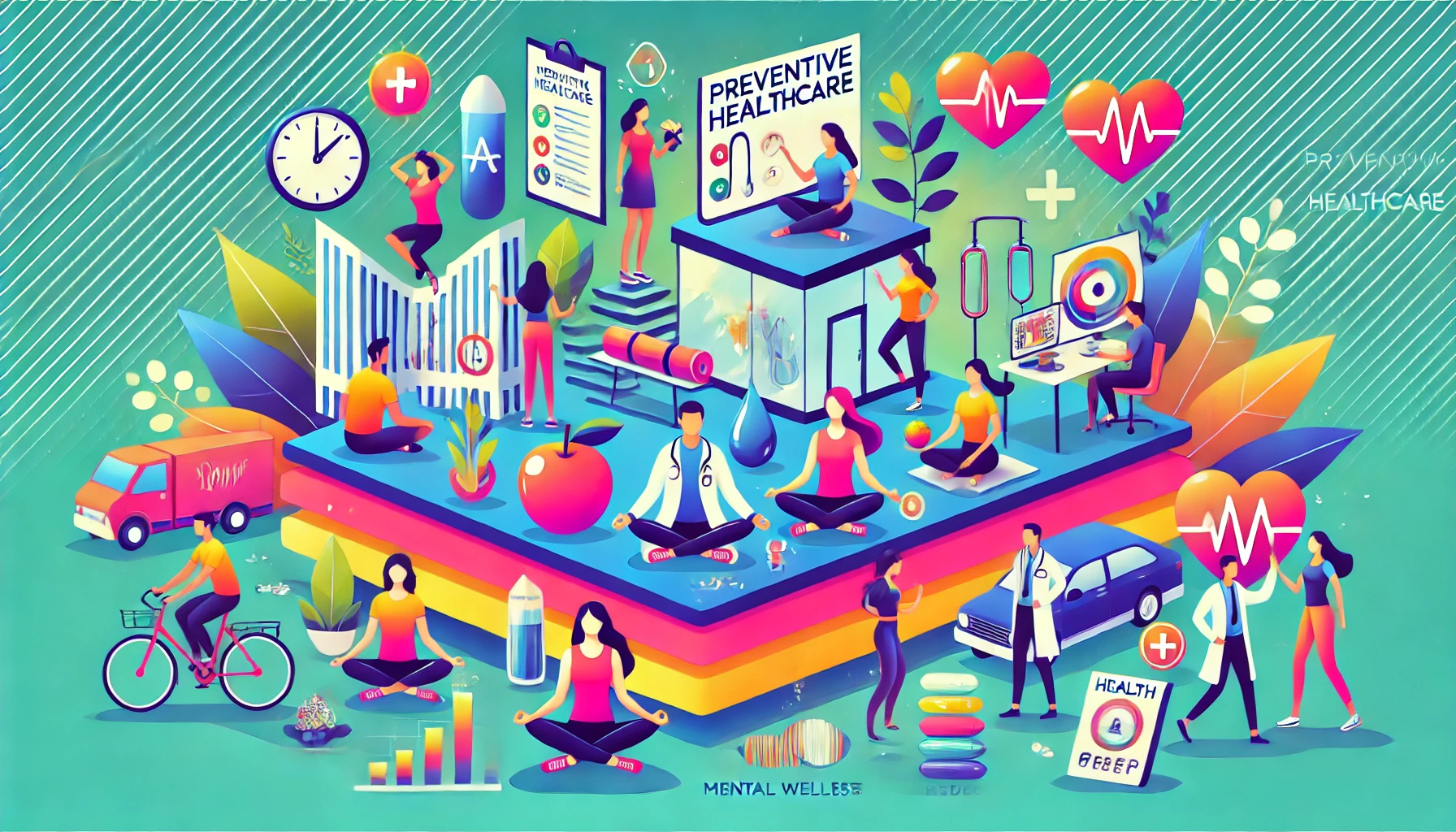Introduction
Preventive healthcare is the key to living a long and healthy life. Instead of waiting for illnesses to develop, taking proactive measures can help reduce the risk of chronic diseases such as heart disease, diabetes, and cancer. Small lifestyle changes—like eating nutritious foods, staying active, and managing stress—can have a significant impact on your overall well-being.
This guide will explore the best strategies for preventive healthcare, offering practical tips to help you stay healthy and thrive.
Understanding Preventive Healthcare
Preventive healthcare focuses on taking early steps to avoid diseases before they occur. It involves medical screenings, lifestyle choices, and vaccinations that reduce health risks.
What is Preventive Healthcare?
Preventive healthcare includes routine checkups, screenings, immunizations, and lifestyle changes that help prevent or detect diseases early. The goal is to promote wellness and reduce the burden of medical conditions.
The Three Levels of Prevention
- Primary Prevention – Prevents disease before it occurs (e.g., healthy eating, vaccines, exercise).
- Secondary Prevention – Detects disease early to prevent progression (e.g., screenings, early treatment).
- Tertiary Prevention – Manages existing diseases to prevent complications (e.g., medication, rehabilitation).
The Role of Nutrition in Preventive Healthcare
Eating well is one of the most effective ways to prevent disease and maintain good health.
Eating a Balanced Diet
A diet rich in fruits, vegetables, whole grains, and lean proteins can prevent obesity, diabetes, and heart disease.
Superfoods for Disease Prevention
- Leafy greens (e.g., spinach, kale) – Support heart and brain health.
- Berries – Rich in antioxidants that fight inflammation.
- Nuts and seeds – Improve heart health and brain function.
- Fatty fish (e.g., salmon) – Reduces the risk of heart disease.
Hydration and Its Health Benefits
Staying hydrated helps maintain body functions, improves digestion, and flushes out toxins. Aim for at least 8 glasses of water per day.
The Importance of Regular Exercise
Staying active is essential for overall health and longevity.
Benefits of Physical Activity
- Reduces the risk of heart disease, diabetes, and obesity.
- Boosts mental health and reduces stress.
- Strengthens bones and muscles, preventing osteoporosis.
Best Exercises for Long-Term Health
- Cardio exercises (e.g., walking, jogging, swimming)
- Strength training (e.g., weightlifting, resistance exercises)
- Flexibility workouts (e.g., yoga, stretching)
How to Stay Active with a Busy Schedule
- Take short walks during work breaks.
- Use stairs instead of elevators.
- Engage in quick home workouts.
Essential Health Screenings and Checkups
Regular health checkups help detect diseases early and improve outcomes.
Routine Medical Tests for Different Age Groups
- Blood pressure screening – Annually after age 40.
- Cholesterol test – Every 4-6 years.
- Diabetes screening – Every 3 years after age 45.
- Cancer screenings – Mammograms, colonoscopies, Pap smears.
Mental Health and Stress Management
Mental well-being is just as important as physical health.
The Connection Between Mental and Physical Health
Chronic stress weakens the immune system and increases the risk of heart disease and depression.
Stress Reduction Techniques
- Meditation and mindfulness.
- Deep breathing exercises.
- Engaging in hobbies and social activities.
The Importance of Sleep in Disease Prevention
Poor sleep increases the risk of obesity, diabetes, and heart disease. Aim for 7-9 hours of sleep per night.
Vaccinations and Immunization
Vaccines protect against infectious diseases and prevent outbreaks.
Why Vaccines Are Crucial for Disease Prevention
Vaccines boost immunity and protect against severe illnesses like the flu, pneumonia, and COVID-19.
Recommended Vaccines for Children and Adults
- Influenza vaccine – Annually.
- Hepatitis B vaccine – Recommended for all age groups.
- HPV vaccine – Protects against cervical cancer.
Preventive Dental and Oral Health
Oral health affects overall health.
The Link Between Oral Health and Overall Health
Poor dental hygiene is linked to heart disease, diabetes, and infections.
Daily Oral Hygiene Habits
- Brush twice daily with fluoride toothpaste.
- Floss daily to remove plaque buildup.
Regular Dental Checkups
Visit the dentist every 6 months for cleanings and exams.
Avoiding Harmful Habits
Unhealthy habits can lead to serious health problems.
The Dangers of Smoking and Alcohol
Smoking increases the risk of lung cancer and heart disease. Excessive alcohol consumption damages the liver and increases cancer risk.
How to Quit Unhealthy Habits Successfully
- Seek support from professionals or support groups.
- Replace bad habits with healthy activities.
